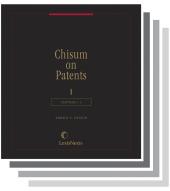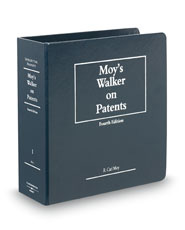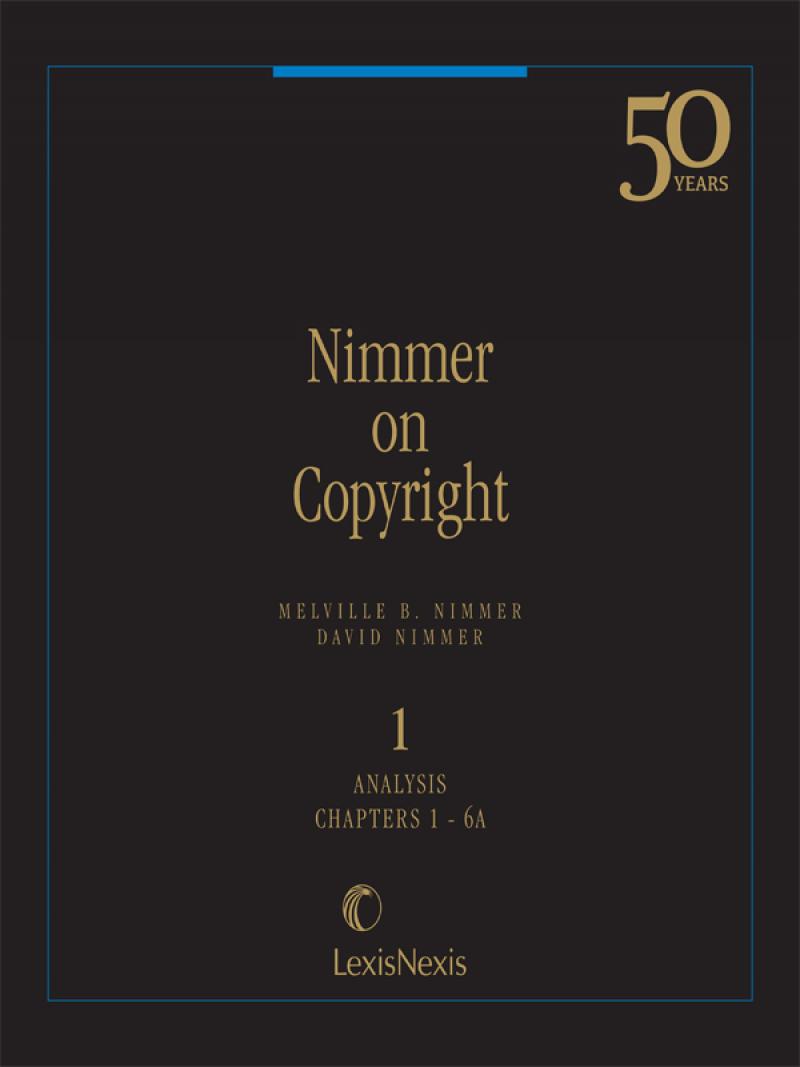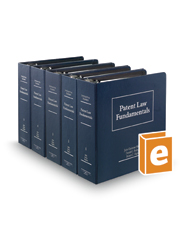Welcome
Welcome
This guide provides information about researching intellectual property law, including books, subscription databases, and free internet resources.
Overview
Intellectual Property: Summaries & Explanations
Get started with these books aimed at law school students.
-
-
Understanding Intellectual Property Law by
Call Number: KF2979 .C478 2020ISBN: 9781531015671Publication Date: 2019 -
Intellectual Property, Patents, Trademarks, and Copyright in a Nutshell by
Call Number: KF2980 .M52 2023ISBN: 9781685619251Publication Date: 2023-08-07 -
Principles of Intellectual Property Law by
Call Number: KF2979 .M94 2017ISBN: 9781634607599Publication Date: 2017
Practice Centers
Practice Centers are landing pages that connect you with curated materials on a legal topic. The following practice centers provide strong starting places for intellectual property research. On these pages you can find cases, statutes and regulations, secondary sources, news and current awareness updates for practitioners.
Intellectual Property In depth
Dig deeper with these treatises on IP law
-
 Epstein on Intellectual Property
by
Call Number: KF2979 .E6724ISBN: 073555983XPublication Date: 2020
Epstein on Intellectual Property
by
Call Number: KF2979 .E6724ISBN: 073555983XPublication Date: 2020 -
Keeping up with IP Law
Sources for news, new scholarship & current awareness
-
SSRN Intellectual Property Law eJournalsWorking papers and pre-publication titles from the various SSRN eJournals on aspects of IP Law
Study tools
CALI Lessons
CALI provides access to interactive, computer-based lessons designed to augment traditional law school instruction. You can use the lessons to supplement your studies and to review specific concepts.
-
CALI Authorization Code & RegistrationHarvard Law School access only. First time users: please register using the HLSL CALI Authorization code.
Patents
Patent Law: Summaries & Explanations
Get started with these books for law school students.
-
Principles of Patent Law by
Call Number: KF3114.85 .S34 2019ISBN: 9780314276681Publication Date: 2019 -
Patent Law in Nutshell by
Call Number: KF3114.85 .A32 2018ISBN: 9781683285311Publication Date: 2018 -
Understanding Patent Law by
Call Number: KF3114 .L36 2018ISBN: 9781531000684Publication Date: 2017
Patent Law in Depth
-
 Chisum on Patents: a Treatise on the Law of Patentability, Validity, and Infringement
by
Call Number: KF3114 .C47Publication Date: 2022
Chisum on Patents: a Treatise on the Law of Patentability, Validity, and Infringement
by
Call Number: KF3114 .C47Publication Date: 2022 -
 Moy's Walker on Patents
by
Publication Date: 2020
Moy's Walker on Patents
by
Publication Date: 2020 -
U.S. Patent & Trademark Office
"The United States Patent and Trademark Office (USPTO) is the federal agency for granting U.S. patents and registering trademarks. In doing this, the USPTO fulfills the mandate of Article I, Section 8, Clause 8, of the Constitution that the legislative branch "promote the Progress of Science and useful Arts, by securing for limited Times to Authors and Inventors the exclusive Right to their respective Writings and Discoveries."
The USPTO website provides education and guidance on how to conduct a patent search:
USPTO also maintains databases that users can search within to learn more about prior art:
The US PTO puts out an Official Gazette, a journal, "published weekly on Tuesday, that includes bibliographic information and a representative drawing for each patent granted or trademark published on that issue date."
Google Patent Search
Google Patents includes U.S. PTO records from 1790 and the WIPO and EPO from 1978.

"You can search the full text of U.S. patents by selecting "Patents" from within Google search, from the search box at the top of any patent page, or by typing the grant or application number into Google." Advanced search features that allow you to find results by criteria such as inventor, classification, keyword, and filing date are also available.
Lexis TotalPatent One
This platform allows you to search issued patents, published patent applications, and utility models, globally. Full-text patent documents from 56 patent authorities are included. It also incorporates analytics, IP documentation, and editorial insights.

You can access Lexis TotalPatent One through the following:
Patent Sight
-
PatentSightComplete patent search database with advanced analytics . PatentSight validates and quality-assures patent data, by assigning patents to their accurate commercial owners and verifying their legal validity and remaining lifetime. Identify real world scenarios for acquisition targeting, R&D research, emerging disruptive technologies and more.
Keeping up with Patent Law
Sources for news, new scholarship & current awareness:
-
SSRN Intellectual Property Patent Law eJournalWorking papers and pre-publication titles on of Patent Law
Copyright
Copyright Law: Summaries & Explanations
Get started with these books for law school students.
-
Understanding Copyright Law by
Call Number: KF2994 .L43 2019ISBN: 9781531010065Publication Date: 2019 -
Examples & Explanations for Copyright by
Call Number: KF2995 .M35 2021ISBN: 9781543825763Publication Date: 2021 -
Copyright Law in a Nutshell by
Call Number: KF2994 .L34 2022ISBN: 9781647082499Publication Date: 2021
Copyright Law in Depth
-
 Nimmer on Copyright
by
Call Number: US 944 NIMPublication Date: 1963-Also available on Lexis Plus Nimmer on Copyright
Nimmer on Copyright
by
Call Number: US 944 NIMPublication Date: 1963-Also available on Lexis Plus Nimmer on Copyright -
-
 Patry on Fair Use
by
Publication Date: 2021
Patry on Fair Use
by
Publication Date: 2021
U.S. Copyright Office
The Copyright Office is a part of the Library of Congress. It was established in 1870, and recognized by Congress as a separate department in 1897. "The Copyright Office registers copyright claims, records information about copyright ownership, provides information to the public, and assists Congress and other parts of the government on a wide range of copyright issues."
Through the Copyright Office you can search copyright records:
The Copyright Office has a notification system, alerts, website postings, and announcements:
Search Copyrights
Fair Use
"Fair use provisions of the copyright law allow use of copyrighted materials on a limited basis for specific purposes without requiring the permission of the copyright holder." This often comes up in the academic context. Below are some materials providing more information and guidance on the fair use doctrine.
Keeping up with Copyright Law
Sources for news, new scholarship & current awareness:
-
SSRN Copyright eJournalWorking papers and pre-publication titles from the various SSRN eJournals on Copyright Law
Trademarks
Trademark Law: Summaries & Explanations
Get started with these books for law school students.
-
Trademark and Unfair Competition in a Nutshell by
Call Number: KF3180 .J26 2021ISBN: 9781647088583Publication Date: 2021 -
Understanding Trademark Law by
Call Number: KF3180 .L34 2020ISBN: 9781531014896Publication Date: 2019
Trademark Law in depth
-
-
 Callmann on Unfair Competition, Trademarks & Monopolies
by
ISBN: 9780420992000Publication Date: 2021
Callmann on Unfair Competition, Trademarks & Monopolies
by
ISBN: 9780420992000Publication Date: 2021
U.S. Patent & Trademark Office
The United States Patent and Trademark Office (USPTO) registers trademarks based on the commerce clause of the Constitution (Article I, Section 8, Clause 3)." Regulations implementing the Trademark Modernization Act of 2020 (TMA) went into effect on December 18, 2021. The USPTO now has "new tools to clear away unused registered trademarks from the federal trademark register and [can] move applications through the registration process more efficiently."
The USPTO website provides education and guidance on how to conduct a trademark search:
USPTO also maintains databases that users can search within to learn more about claimed trademarks:
The USPTO also "handles appeals involving applications to register marks, appeals from expungement or reexamination proceedings involving registrations, and trial cases of various types involving applications or registrations."
The USPTO puts out an Official Gazette, a journal, "published weekly on Tuesday, that contains bibliographic information and a representative drawing for each mark published, along with a list of cancelled and renewed registrations."
Search Trademarks
-
Trademarks Search (Westlaw)Search U.S. federal and state, foreign and international trademark databases
Trademark Primary Law Resources
Keeping up with Trademark Law
Sources for news, new scholarship & current awareness
-
Trademark Law Practice Page (Bloomberg Law)News & current awareness, cases, statutes, & regulations
-
SSRN Trademark Law eJournalWorking papers and pre-publication titles from the various SSRN eJournals on trademark Law
IP Assignment and Licensing
IP Assignment and Licensing
Trade Secrets
Foreign and international
World Intellectual Property Organization
-
WIPO LexIncludes intellectual property (IP) laws and regulations, WIPO-administered treaties and IP‑related treaties, and IP judgments.
Kluwer IP Law
-
Kluwer IP LawIncludes analysis, case law, news and legislation in IP Law across a vast range of jurisdictions.
Getting Help
Contact Us!
Ask Us! Submit a question or search our knowledge base.
Chat with us! Chat with a librarian (HLS only)
Email: research@law.harvard.edu
Contact Historical & Special Collections at specialc@law.harvard.edu
Meet with Us Schedule an online consult with a Librarian
Hours Library Hours
Classes View Training Calendar

